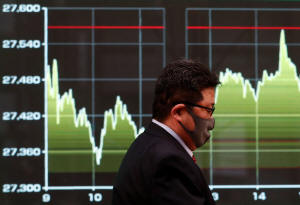Global shares hit fresh peak, oil up on Middle East tensions
 Send a link to a friend
Send a link to a friend
 [February 15, 2021]
By Simon Jessop [February 15, 2021]
By Simon Jessop
LONDON (Reuters) - Global shares rose for
the 11th day in a row to reach a fresh peak on optimism about the
rollout of COVID-19 vaccines and new fiscal aid from Washington, while
tensions in the Middle East drove oil to a 13-month high.
As more people are vaccinated across key markets such as the United
States, and with U.S. President Joe Biden looking to pump an extra $1.9
trillion in stimulus into the economy, the so-called reflation trade has
gathered steam in recent days.
On Friday, The Cboe Volatility Index, known as Wall Street's "fear
gauge", ended at its lowest level for nearly a year, helping drive a
0.4% gain for MSCI's broadest measure of world stocks on Monday.
Taking its cue from a stronger, albeit holiday-thinned, Asian session,
Europe's major indexes were a sea of green in early deals, with
Britain's FTSE 100 up 1.5%.

With China and Hong Kong markets closed for the Lunar New Year holiday,
Japan's Nikkei led the way, climbing 1.9% to reclaim the 30,000-point
level for the first time in more than three decades.
E-mini futures for the S&P 500 were also higher, up 0.4%, although U.S.
stock markets will be closed on Monday for the Presidents Day holiday.
Later in the week, all eyes will be on the release of minutes from the
U.S. Federal Reserve's January meeting, where policymakers decided to
leave rates unchanged, for hints to the likely direction of monetary
policy.
Those concerned about the impact of market exuberance on the outlook for
inflation will also have fresh data to parse, with Britain, Canada and
Japan all due to report. Friday will also see major economies, including
the United States, release preliminary February purchasing managers'
indexes (PMI).
[to top of second column]
|

A man wearing a protective face mask walks past a screen displaying
a graph showing recent Nikkei share average movements outside a
brokerage, amid the coronavirus disease (COVID-19) outbreak, in
Tokyo, Japan December 30, 2020. REUTERS/Issei Kato

"We believe investors should prepare for bouts of volatility ahead,
but regard them as opportunities rather than threats," said Mark
Haefele, chief investment officer at UBS Global Wealth Management.
"We recommend investors stick to their long-term financial plans,
and continue to put excess cash to work."
Oil joined equity markets in pushing higher, reaching its highest
level since January 2020 on hopes U.S. stimulus will boost the
economy and fuel demand and after a Saudi-led coalition fighting in
Yemen said it intercepted an explosive-laden drone fired by the
Iran-aligned Houthi group. [O/R]
Brent crude rose 1.3% to $63.24 a barrel. U.S. crude oil gained 1.8%
to $60.54, just off earlier highs.
With risk assets in favour, safe havens dipped, with gold down 0.2%
to $1,819 an ounce. Germany's 10-year Bund yield rose 4 basis points
to a 5 1/2-month high at -0.376% and 30-year bond yields, up 20 bps
so far this month, rose to an eight-month high at 0.13%. They had
traded in negative yield territory earlier this month.
The dollar remained near two-week lows as traders took a more
cautious view of the pace of the U.S. economy's rebound. Against a
basket of currencies it was last down around 0.1%.
Bitcoin, meanwhile, recovered some of its overnight weakness to
trade down 1.4% at $47,984.96, below a record high of $49,714.66.
(Additional reporting by Dhara Ranasinghe; Editing by Jacqueline
Wong, Alex Richardson, Larry King)
[© 2021 Thomson Reuters. All rights
reserved.] Copyright 2021 Reuters. All rights reserved. This material may not be published,
broadcast, rewritten or redistributed.
Thompson Reuters is solely responsible for this content. |